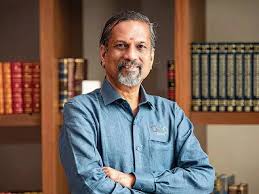Sridhar Vembu: The Visionary Founder of Zoho Corporation

Introduction
Sridhar Vembu, the founder and CEO of Zoho Corporation, has emerged as a significant figure in the Indian technology landscape. His contributions extend far beyond software development; he stands as a testament to entrepreneurial spirit and innovation in India. With Zoho self-funded and an employee-first policy, Vembu has reshaped the way we perceive startups in the country.
Background and Early Career
Born in 1970 in Tamil Nadu, Vembu pursued his education in engineering at the Indian Institute of Technology, Madras, followed by a master’s degree in electrical engineering from Princeton University. In 1996, he co-founded Zoho, originally under the name AdventNet, with a vision to create software that is both powerful and affordable for businesses.
Zoho’s Growth Trajectory
Since its inception, Zoho has grown exponentially, developing a suite of over 45 applications that cater to various business needs, from CRM to project management and accounting. As of 2021, the company reported revenues exceeding $600 million, with a customer base spread across 180 countries. Notably, unlike many tech giants, Zoho has remained privately held, emphasizing sustainability over rapid external funding.
Innovative Business Model
Sridhar Vembu’s leadership style is largely characterized by a commitment to his values, which include fostering a culture of respect and loyalty among employees. His vision of an employee-centric workplace has kept attrition rates low and satisfaction high, contributing significantly to Zoho’s success. Vembu also advocates for rural entrepreneurship, often emphasizing the importance of building successful enterprises that can operate from smaller cities and towns.
Recent Developments
In 2023, Vembu announced plans for new initiatives targeting small and medium enterprises (SMEs) in India, aiming to provide them with affordable, cutting-edge technology solutions. He believes that empowering these businesses is crucial for the economic upliftment of the nation and has released programs aimed at skill development in technology among rural populations.
Conclusion
Sridhar Vembu’s journey with Zoho exemplifies innovation, perseverance, and the power of technology to transform lives. As India continues to establish itself as a global tech hub, leaders like Vembu play a crucial role in inspiring the next generation of entrepreneurs. His focus on sustainability, employee well-being, and rural entrepreneurship could very well shape the future of business in the country, making it essential for readers and aspiring entrepreneurs to keep an eye on his ever-evolving story.









